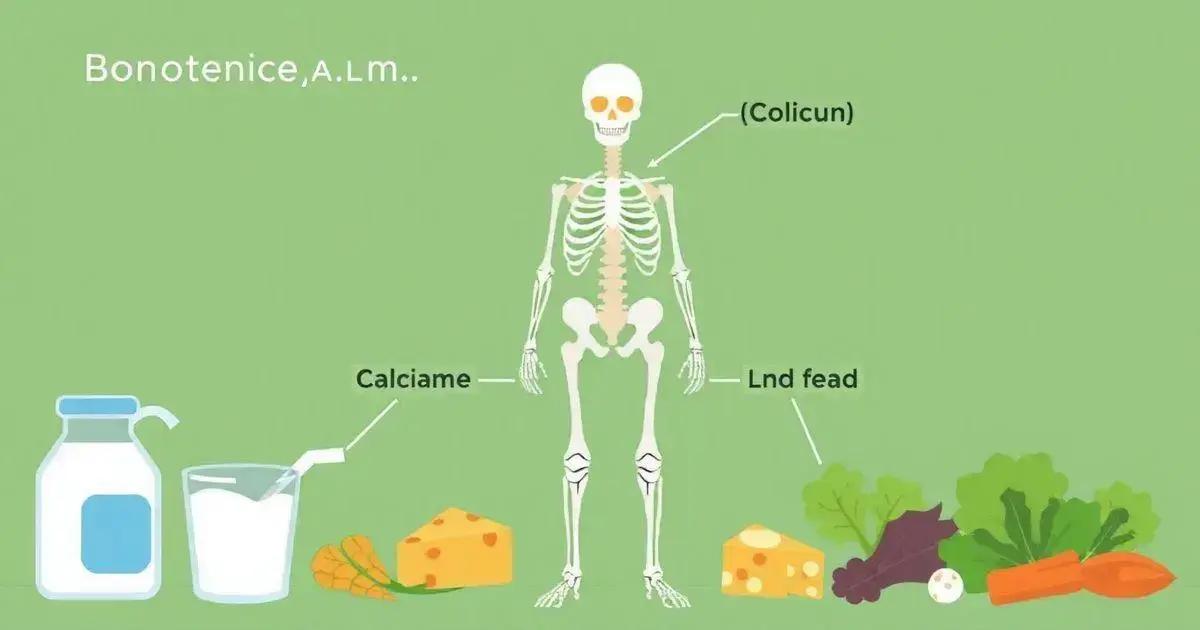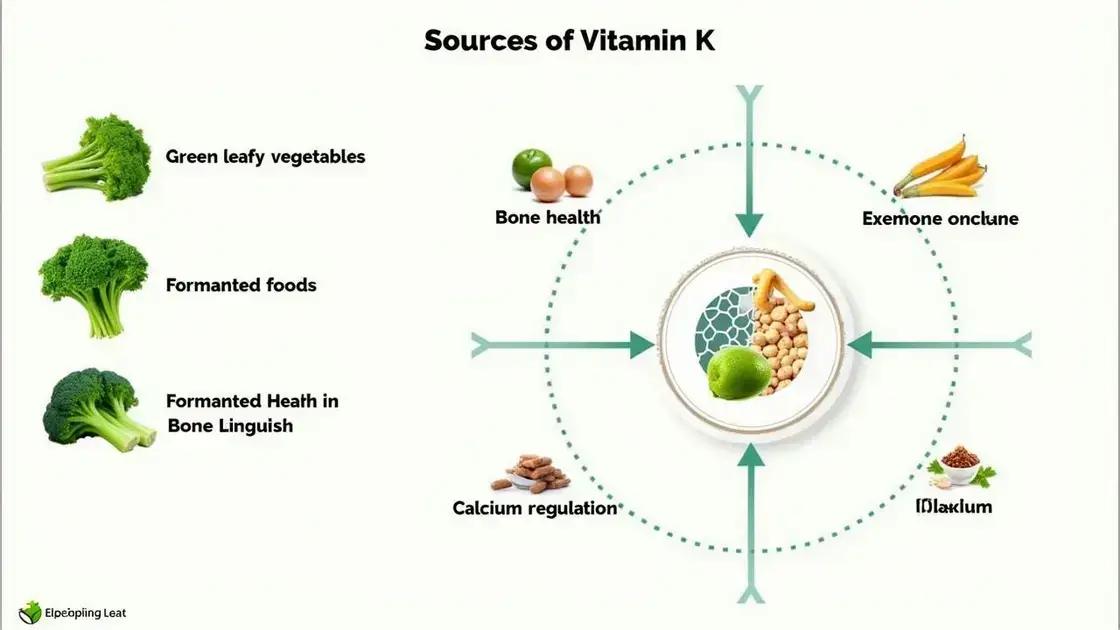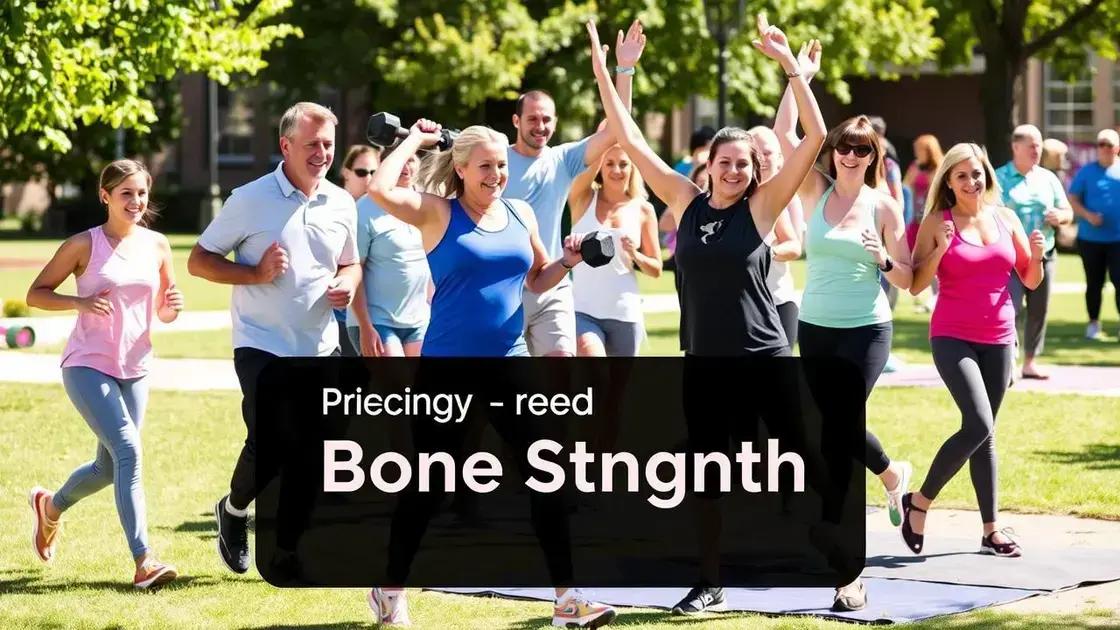To strengthen your bones safely, focus on increasing your intake of calcium and vitamin K through foods like dairy, leafy greens, and fortified products, while incorporating regular weight-bearing and resistance exercises into your routine to enhance bone density and reduce the risk of fractures.
Are you looking for ways to strengthen your bones? Incorporating calcium and vitamin K into your diet can significantly improve your bone health. In this article, we will discuss their importance, sources, and how exercising can enhance the benefits of these essential nutrients. Read on to discover effective strategies to support your bones and maintain a healthy lifestyle!
Understanding Calcium’s Role in Bone Health

Calcium plays a vital role in maintaining strong bones and overall health. It is the primary mineral found in bones, accounting for about 99% of the calcium in your body. Our bones undergo a constant cycle of growth and renewal. They form during childhood and adolescence, peak in density in early adulthood, and then gradually lose density as we age. To support this cycle, an adequate intake of calcium is crucial.
Why Calcium is Important
Calcium is essential for several reasons:
- Bone health: Calcium helps in the formation and maintenance of bone tissue.
- Muscle function: Calcium is necessary for muscle contractions, ensuring proper movement.
- Blood clotting: Calcium plays an important role in the blood clotting process, which is essential for healing.
- Nerve signaling: Calcium ions help transmit signals between nerve cells, facilitating communication throughout the body.
How Calcium Affects Bone Density
A sufficient level of calcium in your diet significantly impacts your bone density. When your body lacks calcium, it may draw calcium from your bones to maintain essential functions. This process can lead to weakened bones and increase the risk of fractures and osteoporosis.
Recommended Daily Calcium Intake
The recommended daily intake of calcium varies by age:
- Children (1-3 years): 700 mg
- Children (4-8 years): 1,000 mg
- Adolescents (9-18 years): 1,300 mg
- Adults (19-50 years): 1,000 mg
- Women over 50 and men over 70: 1,200 mg
It’s important to meet these recommendations to ensure your bones stay healthy and strong.
The Importance of Vitamin K for Bone Strength

Vitamin K plays a crucial role in maintaining bone strength and health. It is essential for bone metabolism and helps regulate calcium within the bones and blood. By supporting bone density, vitamin K helps reduce the risk of fractures and osteoporosis.
The Role of Vitamin K in Bone Health
Vitamin K contributes to bone health in several key ways:
- Activation of Osteocalcin: Vitamin K is necessary for the production of osteocalcin, a protein made by osteoblasts (bone-forming cells). Osteocalcin helps bind calcium to the bone, enhancing bone strength.
- Calcium Regulation: Vitamin K assists in controlling calcium levels in the bloodstream, ensuring that calcium is deposited in the bones rather than in soft tissues.
Types of Vitamin K
There are two main forms of vitamin K:
- Vitamin K1: Found in green leafy vegetables like kale, spinach, and broccoli, vitamin K1 is the primary dietary source of this important nutrient.
- Vitamin K2: Found in fermented foods and some animal products, vitamin K2 plays a key role in bone metabolism and may be even more effective than vitamin K1 in promoting bone health.
Recommended Daily Intake of Vitamin K
The recommended daily intake for vitamin K varies based on age and sex:
- Men (19 years and older): 120 mcg
- Women (19 years and older): 90 mcg
Consuming adequate amounts of vitamin K is vital for maintaining strong bones and preventing bone-related disorders.
Dietary Sources of Calcium and Vitamin K

Getting enough calcium and vitamin K from your diet is essential for bone health. Here are some great dietary sources to consider:
Foods Rich in Calcium
Calcium is found in various foods, including:
- Dairy Products: Milk, yogurt, and cheese are excellent sources of calcium. A cup of milk has about 300 mg of calcium.
- Leafy Greens: Vegetables like kale, bok choy, and broccoli contain calcium. For example, one cup of cooked collard greens has about 350 mg of calcium.
- Fortified Foods: Many cereals and plant milks, like almond or soy milk, are fortified with calcium, providing an easy way to boost intake.
- Fish: Sardines and salmon have edible bones, which are rich in calcium. Just three ounces of canned sardines can provide around 325 mg of calcium.
Foods High in Vitamin K
Vitamin K can also be found in several foods:
- Green Leafy Vegetables: Spinach, kale, and Swiss chard are loaded with vitamin K. A cup of cooked spinach has about 888 mcg of vitamin K.
- Cruciferous Vegetables: Broccoli and Brussels sprouts are good sources. One cup of cooked broccoli provides approximately 220 mcg of vitamin K.
- Fermented Foods: Items like natto and some cheeses are rich in vitamin K2, which boosts bone health.
- Meats: Certain meats, especially liver, are significant sources of vitamin K2. A 3-ounce serving of beef liver contains about 106 mcg of vitamin K.
Including these foods in your diet can help you meet your daily requirements for calcium and vitamin K, supporting stronger bones.
Exercise for Stronger Bones

Exercise is an essential part of maintaining strong bones. Engaging in regular physical activity helps build bone density and strength while preventing bone loss as you age. Different types of exercises can have specific benefits for your bones.
Types of Exercises for Bone Health
Incorporate a mix of the following exercises into your routine:
- Weight-Bearing Exercises: Activities like walking, jogging, dancing, and hiking force you to work against gravity, which helps strengthen bones. Aim for at least 150 minutes of moderate-intensity weight-bearing exercises each week.
- Resistance Training: Lifting weights or using resistance bands can stimulate bone growth. Exercises like squats, lunges, and push-ups help build muscle and improve bone density.
- Balance and Flexibility Exercises: Activities like yoga and tai chi can improve balance and flexibility, reducing the risk of falls and fractures.
Benefits of Exercise for Bone Health
Regular exercise provides various benefits for bone health:
- Increased Bone Density: Exercise helps strengthen bones by promoting the formation of new bone tissue.
- Improved Muscle Strength: Stronger muscles help support the bones and decrease the risk of fractures.
- Enhanced Coordination: Improved balance and coordination help prevent falls, which can lead to bone injuries.
Tips for Exercising Safely
When starting an exercise routine, consider the following tips:
- Always consult with a healthcare provider before starting a new exercise program, especially if you have any health concerns.
- Start slowly and gradually increase the intensity and duration of exercises to prevent injury.
- Choose activities that you enjoy to stay motivated and consistent.
Incorporating these exercises into your lifestyle can significantly contribute to maintaining and strengthening your bones.
How to Safeguard Your Bone Health
In conclusion, strengthening your bones with calcium and vitamin K is essential for maintaining overall bone health. By incorporating calcium-rich foods like dairy and leafy greens, as well as vitamin K sources such as vegetables and fermented foods, you can support strong bones.
Additionally, regular exercise, including weight-bearing and resistance training, plays a vital role in enhancing bone density and reducing the risk of fractures. Remember to commit to a balanced diet and an active lifestyle to ensure the longevity and strength of your bones.
Ultimately, prioritizing bone health will lead to better mobility and a lower risk of bone-related issues as you age, enabling you to enjoy a more active and fulfilling life.
FAQ – Frequently Asked Questions about Strengthening Bones with Calcium and Vitamin K
Why is calcium important for bone health?
Calcium is essential for building and maintaining strong bones, making up about 99% of the bone structure.
What role does vitamin K play in bone strength?
Vitamin K is crucial for the activation of proteins that bind calcium to the bones, helping improve bone density and reduce fracture risk.
What foods should I eat for adequate calcium and vitamin K?
Dairy products, green leafy vegetables, and fortified foods are excellent sources of calcium, while vitamin K can be found in leafy greens, fermented foods, and certain meats.
How much calcium and vitamin K do I need daily?
Adults generally need about 1,000 mg of calcium daily, increasing to 1,200 mg for women over 50 and men over 70. Recommended vitamin K intake is 120 mcg for men and 90 mcg for women.
What exercises are best for strengthening bones?
Weight-bearing exercises such as walking, jogging, and resistance training like lifting weights are great for building bone density.
Can I strengthen my bones if I’m older?
Yes! It’s never too late to start. Regular exercise and a proper diet rich in calcium and vitamin K can enhance bone strength at any age.













